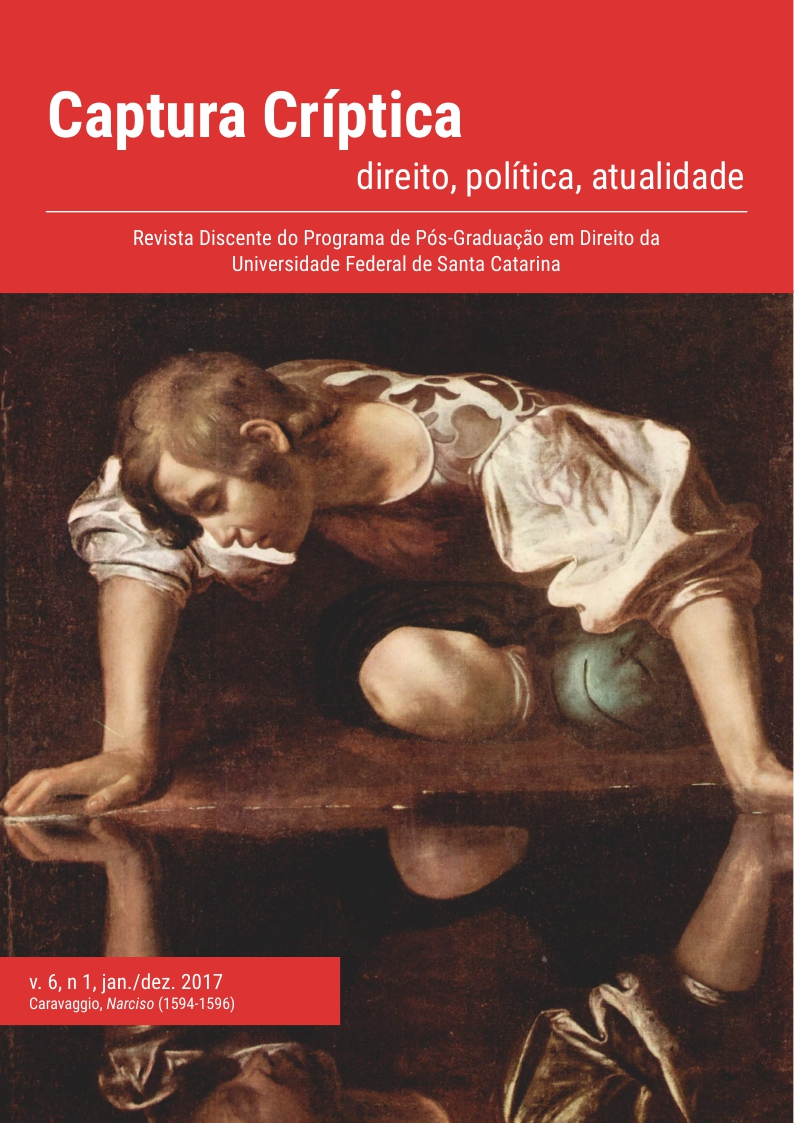“Aqueles que lutam para viver”: the State’s re-fundation by “the Horizon of Pluralistic Constitucionalism”
Keywords:
National States, pluralistic constitutionals cycles, indigenous peopleAbstract
The formation of the national States by the national criolla-mestizo elites in Latin America represented one more systematic and historical form of exclusion and subalternization of all organizational possibilities of the native people. This formation, that, in the constitutionalism, was operated by silencing, besides the non-recognition of ethnic diversity and its autonomies front to the mono-ethnicity, the monoculturalism, the uni-nationalism, the homogenization and the legal monism of the Nation-State. The 1980s is the precursor in the constitutional change of indigenous rights, “the horizon of pluralistic constitutionalism”, which is divided into three cycles: multicultural, pluricultural and plurinational. The objective of this paper is to present the institutional-legal changes that happened in these pluralistic constitutional cycles, since the ideologically/legal-institutional surpassing until its ruptures with the “National State” myth, so to describe the consolidation of the national State myth before and after the 1980s landmark, the most important indigenous rights that were conquered during the referred cycles, besides the influence of the international and national documents to the native people. Therefore, it was used as landmark the decolonial studies and the “critical interculturality”. It was worked with the question of how did the legal-institutionals changes occurred in each pluralistic cycle according to the time mark with regard to the indigenous rights. At the end, it presents that the multicultural cycle represented the recognition of indigenous rights, although it only ideologically surpassed the hegemonic thought of its time – the integrationism; about the posterior cycles - the pluricultural and the plurinational – both allowed the decolonial rupture in the State’s structures, even though that one has had its achievements neutralized by the neoliberal politic. The last one re-founded the State on its own bases, these ones coming from decoloniality, and based on critical interculturality, however, always making necessary to recognize the limits of making effective what was guaranteed in the constitutions.
References
CLASTRES, Pierre. A sociedade contra o Estado: pesquisas de antropologia política. Traduzido por Theo Santiago. São Paulo: Cosac Naify, 2003.
CONSTITUICIÓN Política Feminista del Estado, 2008. Disponível em: <https://www.mujerescreando.org/pag/articulos/2008/cosntitucionpoliticadelestado.htm >. Acesso: mar. 2018.
DECLARACIÓN de Barbados I, 1971. Disponível em: < http://www.libertadciudadana.org/archivos/Biblioteca%20Virtual/Documentos%20Informes% 20Indigenas/Documentos%20Internacionales/Declaracion%20de%20los%20Pueblos%20Indi genas/Declaracion%20Barbados%201971.pdf >. Acesso fev. 2017.
DUSSEL, Enrique. 1492 – el encubrimiento del Otro: hacia el origen del “mito de la Moderdnidad”. La Paz: Plural editores, 1994.
FONSECA, Lívia Gimenes da. Despatriarcalizar e Decolonizar o Estado Brasileiro: um olhar pelas políticas públicas para mulheres indígenas. 2016. Tese de doutorado – Faculdade de Direito, Universidade de Brasília, Brasília.
GAVERNET, Leticia; MONTE, María Eugenia. La incorporación de los derechos sexuales y reproductivos en las constituciones de Argentina, Venezuela, Ecuador y Bolivia. In: MÓRAN
FAGUNDES, José Manuel (edit.). Sexualidades, desigualdades y derechos: reflexiones en torno a los derechos sexuales y reproductivos. Córdoba: Ciencia, Derecho y Sociedad Editorial, 2012. Disponível em: < https://programaddssrr.files.wordpress.com/2013/05/la- incorporacic3b3n-de-los-derechos-sexuales-y-reproductivos-en-las-constituciones-de- argentina-venezuela-ecuador-y-bolivia.pdf >. Acesso mar. 2018.
HOBSBAWN. Eric. A construção das nações. In: A Era do Capital – 1848-1875. 3. ed. Rio de Janeiro: Paz e Terra, p. 97-112, 1982.
_____. Nações e Nacionalismo desde 1789: programa, mito e realidade. Rio de Janeiro: Paz e Terra, 1990.
LACERDA, Rosane Freire. “Volveré, y Seré Millones”: contribuições descoloniais dos movimentos indígenas latino americanos para a superação do mito do Estado-Nação. 2014. Tese de doutorado – Faculdade de Direito, Universidade de Brasília, Brasília.
MARÍN, María Paz; WASSMANSDORF, Marina Lis. El movimiento indígena y el feminismo desde AbyaYala: Una perspectiva poscolonial de la sexualidad feminina. Disponível em: <http://www.idaes.edu.ar/pdf_papeles/16.%20Wassmansdorf%20artigo%20estudos%20poscoloniais%20feminismo%20descolonial%20bs%20as.pdf >. Acesso mar. 2018.
NACIONES UNIDAS. Declaración de las Naciones Unidas sobre los derechos de los pueblos indígenas. Publicado: mar/2008. Disponível em: < http://daccess-dds-ny.un.org/doc/UNDOC/GEN/N06/512/10/PDF/N0651210.pdf?OpenElement >. Acesso maio 2017.).
ORGANIZACIÓN INTERNACIONAL DEL TRABAJO (OIT). Convenio sobre pueblos indígenas y tribales, 1989 (núm. 169). Disponível em: < https://www.ilo.org/dyn/normlex/es/f?p=NORMLEXPUB:12100:0::NO::P12100_ILO_CODE:%20C169 >. Acesso mar. 2017.
_____. Convenio sobre poblaciones indígenas y tribales, 1957 (núm. 107). Convenio relativo a la protección e integración de las poblaciones indígenas y de otras poblaciones tribales y semitribales en los países independientes. Disponível em: <http://www.ilo.org/dyn/normlex/es/f?p=1000:12100:0::NO::P12100_ INSTRUMENT_ID,P12100_LANG_CODE:312252,es >. Acesso mar. 2017.
QUIJANO, Aníbal. Colonialidade do Poder, Eurocentrismo e América Latina. In: Edgardo LANDER (Org.). A Colonialidade do saber. Eurocentrismo e ciências sociais. Perspectivas latinoamericanas. Colección Sur Sur, CLACSO. Ciudad Autônoma de Buenos Aires: Argentina, 2005.
SEGATO, Rita. Género y Colonilidad: del patriarcado comunitario de baja intensidad al patriarcado colonial moderno de alta intensidad. In: SEGATO, Rita. La crítica de la colonilidad en ocho ensayos: y una antropologia por demanda. Ciudad Autonoma de Buenos Aires: Prometeo Libros, 2013.
SOUSA SANTOS, Boaventura de. La refundación del Estado y los falsos positivos. In: BALDI, César A. (Coord.) Aprender desde o Sul: novas constitucionalidades, pluralismo jurídico e plurinacionalidade aprendendo desde o Sul. Belo Horizonte: Fórum, 2015.
TARDUCCI, Mónica. Abusos, mentiras y vídeos. A propósito de la niña wichi. Boletín de Antropología y Educación, Año 4, n. 5, 2013. Disponível em: < http://hum.unne.edu.ar/generoysex/seminario4/s4clase2_3.pdf >. Acesso mar. 2018.
WALSH, Catherine. Interculturalidad, plurinacionalidad y decolonialidad: las insurgencias político-epistémicas de refundar el Estado. Tabula Rasa, Bogotá, n. 9, p. 131-152, dec. 2008.
WOLKMER, Antonio Carlos; FAGUNDES, Lucas Machado. Estado plurinacional e pluralismo jurídico. Pensar. Revista de Ciências Jurídicas. Fortaleza: Unifor. v.16, n. 2, jul./dez. 2011. p. 371-408.
Y-JUCA-PIRAMA – O índio: aquele que deve morrer. Dez/1973. Disponível em: < https://issuu.com/porantim/docs/120823131950-87492f2fdeed452da6721d1cb19b9d17 >. Acesso fev. 2017.
YRIGOYEN FAJARDO, Raquel. El Horizonte del Constitucionalismo Pluralista: del multiculturalismo a la descolonización. In: César Rodríguez GARAVITO (Coord.). El Derecho en America Latina: Un mapa para el pensamiento jurídico del siglo XXI. Buenos Aires: Siglo Veinteiuno Editores, 2011, p.139-159.
_____. Hitos del Reconocimiento del Pluralismo Juridico y el Derecho Indígena en las Políticas Indigenistas y el Constitucionalismo Andino. In: BERRAONDO, Mikel (Coord.) Pueblos Indígenas y Derechos Humanos. Bilbao: Universidad di Deusto, 2006.
Downloads
Published
Issue
Section
License
Copyright (c) 2018 Captura Críptica: direito, política, atualidade

This work is licensed under a Creative Commons Attribution-NonCommercial-NoDerivatives 4.0 International License.
Submissions published in the Captura Críptica Journal are under the Creative Commons Attribution-noncommercial-NoDerivatives 4.0 International License.










